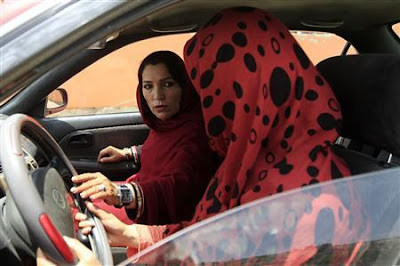 |
| The morning after the Taliban fell Shakila Naderi shed her head-to-toe burqa, sat behind the wheel of a car for the first time and asked her husband to teach her how to drive. |
Now Kabul's only female driving instructor, she teaches women a rare skill that confronts harsh opposition in ultra-conservative, Muslim Afghanistan.
"It bothers men when women drive," Naderi, 45, said from behind her desk in her four-room driving school near Kabul's city centre, decorated with traffic signs and instructions in her native Dari.
"But I wasn't scared of them then and I am not scared of them now," she said, adjusting her green headscarf.
Naderi opened the school four years ago with her husband Iqbal Khan, who as a taxi driver took pity on women he saw struggling to find transportation in a country where many will not speak to men other than relatives.
Women have regained rights such as education, voting and work since the removal of the Taliban and their austere rule a decade ago, but they enjoy far less freedom than men.
Women complain of unwanted gazes and physical harassment on the cramped, crowded minibuses that are often the only method of urban public transport.
When Naderi Driving School opened, Naderi received verbal threats from the more conservative sectors of society, who decry driving as un-Islamic for women. Those have died down, she says, but male drivers often taunt her and try to chase her car off the road, sometimes causing her to swerve dangerously.
Families also bar daughters from driving, fearing it could lead them astray. Naderi's own two daughters have been prohibited by their husbands' families from learning to drive.
TAKING CONTROL OF ONE'S LIFE
A white headscarf wrapped around her wrinkled face, student Khanum Gul Obedi, 46, says she wants to take control of her life.
The mother of two teen daughters has a disabled husband and cannot afford to take taxis with fares of 300 Afghani per ride. She walks for hours around Kabul every day dropping her kids off at school and buying food.
"I never opened a book in my life besides the holy Koran, I never entered through the doors of a school," said Obedi, who is illiterate like most Afghan women.
"I got married and felt imprisoned, but now I can control things and I feel like I've been set free."
The school once mustered only one to five students for a 36-day course, a precursor to applying for a licence.
Classes now number up to 80, and some students travel from nearby provinces. In a room filled with car parts and smeared with grease, Naderi also teaches women how to deal with breakdowns.
Naderi and her husband must read out driving manuals to students in a country where more than 80 percent of women cannot read or write, an illiteracy rate double that of men.
Their work has paid off.
Kabul issued a record 312 driving licences to women last year, the traffic department said. Herat in the west and Mazar-e-Sharif in the north gave out 64 and 48 respectively to women taught mainly by other women but also by some men.
The government backs Naderi's school and has encouraged female employees to attend. But the couple's ads on billboards are often defaced or torn down.
"Boys tease me because I want to drive," said college graduate Mersal Nawabi, 21. "But I am encouraged by my brothers and father."
Student Obedi says she would never take driving lessons from a man. "This is Afghanistan. People talk and by having a woman instructor gossip is kept to a minimum".
As Naderi leaves her school and walks towards her car, a group of men nearby scream: "Hey you! We can drive too".
"I react to them as men would," she says with a grimace.
"Once I got out of my car, yelled back and slapped one so hard he bled. Then I got back into the car to teach the girls".
No comments:
Post a Comment